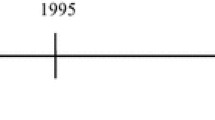Abstract
Van Fraassen believes our current best theories enable us to make accurate predictions because they have been subjected to a selection process similar to natural selection. His explanation for the predictive success of our best theories has been subjected to extensive criticism from realists. I aim to clarify the nature of van Fraassen’s selectionist explanation for the success of science. Contrary to what the critics claim, the selectionist can explain why it is that we have successful theories, as well as why it is reasonable to expect past successful theories to be successful in the future. I also argue that the plausibility of the realists’ explanation rests on an inaccurate understanding of the nature of predictive success. The predictive success of our best theories is a relative success.
Similar content being viewed by others
Notes
Merton (1973) developed an account similar to Hull’s, emphasizing the important role played by the social structure of science in enabling scientists to realize their epistemic goals.
Dear (2001) suggests that in the middle ages, “generally, the desideratum was to locate planets within the correct zodiacal sign, i.e. to within fifteen degrees” (p. 171, note 2).
This concern was raised by one of the referees.
References
Blackburn, S. (2005). Truth: A guide. Oxford: Oxford University Press.
Campbell, D. T. (1977). Comments on ‘the natural selection model of conceptual evolution’. Philosophy of Science, 44, 502–507.
Carrier, M. (1991). What is wrong with the miracle argument? Studies in the History and Philosophy of Science, 22(1), 23–36.
Dear, P. (2001). Revolutionizing the sciences: European knowledge and its ambitions (1500–1700). Princeton: Princeton University Press.
Galison, P. (1987). How experiments end. Chicago: University of Chicago Press.
Hull, D. L. (1988). Science as a process: An evolutionary account of the social and conceptual development of science. Chicago: University of Chicago Press.
Kitcher, P. (1993). The advancement of science: Science without legend, objectivity without illusions. Oxford: Oxford University Press.
Kukla, A. (1996). Antirealist explanations of the success of science. Philosophy of Science (Proceedings), 63, S298–S305.
Laudan, L. (1984a). Science and values: The aims of science and their role in scientific debate. Berkeley: University of California Press.
Laudan, L. (1984b). Explaining the success of science. In Cushing, et al. (Eds.), Science and reality: Recent work in the philosophy of science (pp. 83–105). Notre Dame: University of Notre Dame.
Leplin, J. (1997). A novel defense of scientific realism. Oxford: Oxford University Press.
Lipton, P. (2004). Inference to the best explanation (2nd ed.). London: Routledge.
Merton, R. K. (1973). In N. W. Storer (Ed.). The sociology of science: Theoretical and empirical investigations. Chicago: University of Chicago Press.
Musgrave, A. (1988). The ultimate argument for scientific realism. In Nola (Ed.), Relativism and realism in science (pp. 229–252). Dordrecht: Kluwer.
Papineau, D. (1996). Introduction. In D. Papineau (Ed.), The philosophy of science (pp. 1–20). Oxford: Oxford University Press.
Popper, K. R. (1971). Objective knowledge: An evolutionary approach. Oxford: Clarendon Press.
Psillos, S. (1999). Scientific realism: How science tracks truth. London: Routledge.
Stanford, P. K. (2006). Exceeding our grasp: Science, history, and the problem of unconceived alternatives. Oxford: Oxford University Press.
Van Fraassen, B. C. (1980). The scientific image. Oxford: Clarendon Press.
Van Fraassen, B. C. (1989). Laws and symmetry. Oxford: Clarendon Press.
Worrall, J. (1989). Structural realism: The best of both worlds? Dialectica, 43(1–2), 99–124.
Wray, K. B. (2007). A selectionist explanation for the success and failures of science. Erkenntnis, 67(1), 81–89.
Wray, K. B. (2008). The argument form underconsideration as grounds for anti-realism: A defence. International Studies in the Philosophy of Science, 22(3), 317–326.
Acknowledgments
I thank the following people for feedback on earlier drafts: Lori Nash, Kristina Rolin, Kyle Stanford, Todd Grantham, Brad Monton, and Sarah Scott. As well, I thank my audiences at the Eastern Division meeting of the American Philosophical Association and the Canadian Society for the History and Philosophy of Science meeting where I presented earlier drafts. Finally, I thank the referees for Erkenntnis for their helpful feedback.
Author information
Authors and Affiliations
Corresponding author
Rights and permissions
About this article
Cite this article
Wray, K.B. Selection and Predictive Success. Erkenn 72, 365–377 (2010). https://doi.org/10.1007/s10670-009-9206-6
Received:
Accepted:
Published:
Issue Date:
DOI: https://doi.org/10.1007/s10670-009-9206-6



